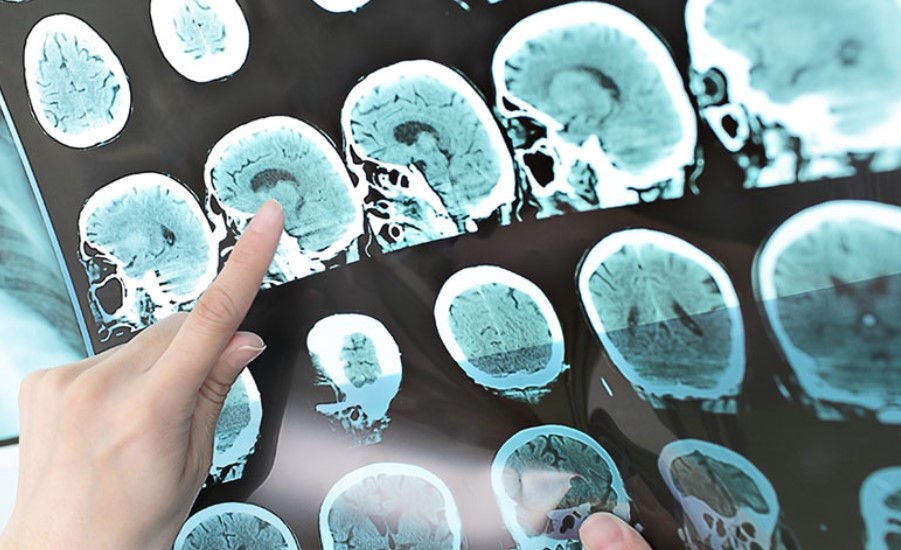The metabolome and the brain


The metabolome and the brain
Neurometabolomics studies have become a leading approach to better understand the role of metabolites in the processes and the function of the brain.
A rapidly growing area in this field explores the relationship between the gut and the brain is known as the gut-brain axis. Gut microbiota has been shown to release or modify some metabolites within the host. These metabolites do not only effect changes in the host‘s behaviour, but are also involved in the causation of chronic diseases of the brain.
Neurometabolomics studies have become a leading approach to better understand the role of metabolites in the processes and the function of the brain.
A rapidly growing area in this field explores the relationship between the gut and the brain is known as the gut-brain axis. Gut microbiota has been shown to release or modify some metabolites within the host. These metabolites do not only effect changes in the host‘s behaviour, but are also involved in the causation of chronic diseases of the brain.
Neurometabolomics
The brain is the central processing unit of many organisms. It has a special layer of blood vessels that protects it from harmful toxins while still allowing for the passage of nutrients. This layer is known as the blood-brain barrier. The blood-brain barrier is composed of a dense web of blood capillaries that provide enough fuel to run the brain without exposing it to potential toxic effects.
The blood-brain barrier has always been a major obstacle to overcome in the attempts to introduce therapeutics into the brain. However, in recent studies researchers have shown that some microbial metabolites are able to bypass this barrier and affect brain function. With nutrition being identified as a major factor in modulating our microbiota, it is becoming more evident that the food we eat might be one of the important factors influencing our brain function.
By studying the effects of the metabolites present in our food and how they affect our microbiome, scientists will be able to gain a better understanding of how our diet can affect our brain’s health and well-being.
Related products
MxP® Quant 500 kit
The most comprehensive kit to study mechanisms of disease, nutrition, and the microbiome
AbsoluteIDQ® Bile acids kit
The benchmark solution to assess host-microbiota interaction
Tryptophan metabolism assay
The assay for the dedicated study of the tryptophan pathway
Why study the metabolome when thinking about brain diseases?
Why do circulating metabolites influence the brain? Which diseases correlate with specific metabolites in the brain?
Alzheimer’s disease (AD) and bile acids
Bile acids are steroid acids that are synthesized in the liver. They are found predominantly in the bile of mammals and vertebrates. These primary bile acids are conjugated within the liver to become water-soluble and secreted into the lumen of the intestine by the gall bladder. Once in the intestine they are modified by gut bacteria and converted into what is known as secondary bile acids.
Secondary bile acids enter the bloodstream through reabsorption via the terminal ileum. They have been shown to have signaling functions in their interaction with the intracellular receptors. Bile acids change during AD. Due to the robust correlation of bile acid ratios with the progression of Alzheimer’s disease, measuring plasma bile acid concentrations has become an essential part of Alzheimer’s disease research.
Serotonin, tryptophan and the gut-brain axis
The amino acid tryptophan plays an essential part in our diet. Tryptophan needs to be acquired by nutrition. It has also been implicated in the relationship between the microbiome and the brain. Serotonin is a monoamine neurotransmitter that has been shown to be mostly derived in the gastrointestinal tract.
Insufficient levels of both, tryptophan and serotonin, can lead to impaired learning, sleep, and mood. Reduced tryptophan and serotonin levels also have been reported in depression, anxiety, and schizophrenia. The spectrum of metabolites formed from tryptophan includes neurotoxic metabolites such as quinolinic acid and 3-hydroxykynurenine as well as neuroprotective metabolites such as kynurenic acid.
Getting the whole story in Multiple Sclerosis
Multiple sclerosis (MS) is an autoimmune disease affecting 2.5 million people worldwide and has a high prevalence in young and middle-aged women. MS is an unpredictable and hard to diagnose disease of the central nervous system. It manifests itself in the disruption of the flow of information within the brain and between the brain and body.
The cause of MS is unknown. It is believed that a combination of environmental and genetic factors may contribute to the risk of developing MS. However, metabolomics may hold the key to better understand the disease and define its treatment options and progression.
More resources on neurometabolomics
No Results Found
The page you requested could not be found. Try refining your search, or use the navigation above to locate the post.
For research use only | not for use in diagnostic procedures.



